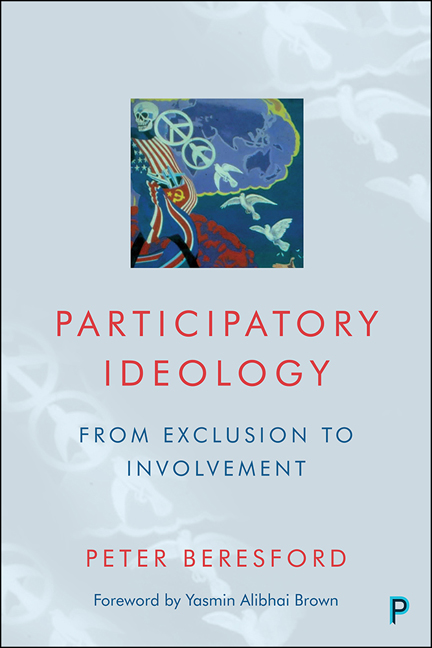1 - Ideology: an exclusionary idea?
Published online by Cambridge University Press: 21 December 2021
Summary
ideology ˌʌɪdɪˈɒlədʒi,ɪd-/noun noun: ideology; plural noun: ideologies 1. a system of ideas and ideals, especially one which forms the basis of economic or political theory and policy.
Google/OxfordLanguagesDefining ideology
The aim of this book is to encourage fresh debate about ideology in relation to participation. But it is important as a starting point to examine existing discussions of ideology. We are unlikely to make much progress if we don't learn from what's already been done and is already known. But this is no simple task. Not only is the aim to get beyond existing discussions, in this non-expert author's view, such discussions are also often complex and opaque. Nonetheless, they demand investigation, if we want to take either discussion or action on ideology forward in any helpful way. So the aim of this first part of the book is to introduce the reader to the subject through a short, but hopefully not simplistic, discussion of ideology drawing on the existing literature. If there's one thing I’ve learned in attempting this task, it is that while ideology may impact on all of us, in one way or another, it is something few of us seem to feel at home with.
So here, you might say, is the background science. Even attempting this task is complex because this field has developed its own massive literature, its own lexicon and field of study. Even the people arguing about ideology are, as might be expected, themselves coming from an ideological position. Thus, it is not only that the content of their discussion relates to ideology, but that it is also shaped by their particular ideological affiliations and commitments.
Commonsense understandings
So what is ideology? As with all words that aren't in commonplace use, the first task is to define our terms. What does it mean? What domain does it delineate? This is easier said than done, as becomes clearer when we investigate what might be called the ‘expert discourse’ in the next section. But there is a constellation of meanings that tend to be attached to ‘ideology’.
When we look up the word in dictionaries, the definitions they offer highlight ideology's relationship with values, beliefs and ideas.
- Type
- Chapter
- Information
- Participatory IdeologyFrom Exclusion to Involvement, pp. 11 - 22Publisher: Bristol University PressPrint publication year: 2021



